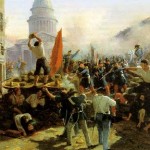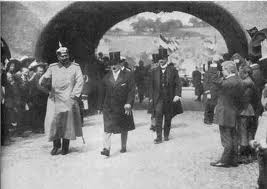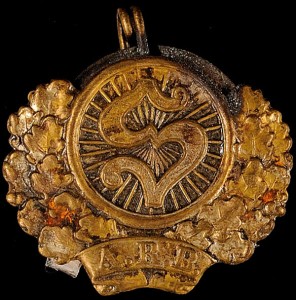Joseph Chamberlain is nowadays a half-remembered – by aficionados of British imperial history and resentful Irish nationalists – politician from the 19th century. Mostly he is remembered for siring two sons who followed him into politics and even then he owes that vicarious longevity to one of those sons being Neville Chamberlain, who conveniently – if unfairly – serves as a bumbling foil to the heroic Churchill in the conventional narrative surrounding World War II.
In his day, however, the elder Chamberlain was a heavyweight in his own right, involved in major issues in an array of different fields: he was a pioneering liberal radical in 1870s who sunk Irish Home Rule in 1886; a proponent of alliance with labour who ended up merging with the Tories, a radical who initiated progressive domestic legislation while aggressively pursuing an expansionary colonial policy and, not least, an imperial visionary who saw that Britain needed to centralise its far-flung oceanic empire into an imperial state if it was to compete with the looming continental-sized powers of the 20th century.
He also personifies the transition of Britain from being a strictly aristocratic state to being a capitalist one. Before he went into politics Chamberlain, a scion of industrious Unitarians, was a successful capitalist in the manufacturing town of Birmingham. His biographer Peter Marsh recounts an episode early in his career where the young Chamberlain attended a function of the great and good of the city. An ordinary practice, then and now, where the well-to-do get to network with each other. What distinguishes then from now, however, is that the room was divided; the landed gentry held the upper end while the industrial elite were separated from them by a silk cord. The message was clear: a capitalist was of lower rank than an aristocrat.1
Nor was England an exception; if anything it was further along the route to modern capitalism that others were soon to traverse. Germany for instance was not only dominated by an antiquated aristocracy, it was ruled by it. The commanding heights of the army and bureaucracy were reserved for scions of noble blood and their positions were not merely symbolic; much of the pressure for war in 1914 emanated from this strata.
In this essay I aim to take a look at the European state when the socialist movement was being born. Like everything human, it was imprinted in its youth with the peculiarities of its environment. These early impressions have continued to colour our conception of the state and, as a consequence, serve to place boundaries around the range of strategies that are generally considered acceptable to radical socialists.
Capitalism: the 19th century’s future
Capitalism in the 19th century was still in the process of penetrating Europe, which is to say, obviously, that it hadn’t yet done so. While it was proceeding at its leisurely pace, the old forms of society lingered on, not least the state apparatus but also cultural norms such as the place of women in society, the churches, the deference shown to the upper-class and so on. Thus, while socialists in the late 19th and early 20th century talked regularly of the bourgeois state, in reality they were living under a similar, though not identical, regime to that of their grandfathers in 1848. And the 1848 revolutions were classic instances of bourgeois revolutions, that is to say, of modernisation: their objective long-term result was to advance democratic capitalism no matter what the intentions of its participants happened to be.
Apart from a brief, inevitably Parisian, flourish in June of that year, there was exceedingly little socialist content to 1848. In fact they were the first throw of the bourgeois dice in many countries, France excepted, to cast aside the Absolutist state formation, in favour of some version of liberal democracy. And as happens in revolutions there was always a left-wing who attempted to keep the revolutionary process rolling in a radical direction.
1848, for the most part, fizzled out or was crushed under aristocratic reaction. The absolutist regimes lingered on right up until 1918. But capitalism waits for no man and beneath the political surface the underlying material foundations were changing: social power was increasingly to be derived from capitalist production as foreign goods began to level the aristocratic fortifications of continental Europe.
The inherent superiority of the capitalist mode of production, as exhibited by England’s financial, industrial, and therefore military hegemony induced – forced even – rival states to be amenable to capitalism. The ruling class within these societies (Austria, Prussia, Russia etc) permitted and in some case even fostered capitalist activity through gritted teeth; their social power depended on a very different mode of production: the extraction of wealth directly, via a fusion of political and economic power, from the peasantry. They were landed aristocrats, not capitalists and they looked down on the latter as vulgar upstarts.
But however much the aristocracies of Europe might dislike capitalism, they could not, as the wielders of state power, afford to forego the advantages it would bring in the inter-state competition. France, for example, suffered from inferior artillery in the 1870 compared to Prussia and this was the result of Prussian industrial and technical superiority, a fact which could not be remedied by extracting more wealth or even manpower from Algerian peasants. It required a capitalist solution because capitalism is naturally prone to develop advanced technology given the incessant class struggle between workers and employers.
Even the ultra-conservative nobility such as the Prussian Junkers began to produce agricultural commodities for the world market. Indigenous capital began to spring up in response to the foreign pressure; factories were built, peasants migrated into quickly expanding cities; the urban intellectuals – journalists, lawyers, technicians, and artists – increased along with the newly minted proletariat.
And so, as the decades passed, the social consequences that accompanied the slow rise of capitalism – freedom of speech, organising and assembly, jury trials, and, not least, the space to start a business – became more and more the norm in Europe. These days, ‘freedom of speech’ tends to conjure up images of pornographers defending their right to make money off the portrayal of sex, but in its day it had a more vital association with politics. That is, a society with a modicum of free speech was one which permitted political criticism to be aired and, therefore, opposition to be organised. This was not a trivial right at the time and the gradual extension, in practice, of the right to free speech and organisation was a major extension of liberty in most of Europe.
Although the 1848 revolutions were suppressed, just as their ancestral forebear of 1793 was, the ideas they encapsulated could not be. European states were states in transition from absolutism to democratic capitalism but the journey was anything but straightforward, to wit, Marx’s characterisation of the Kaiserreich as a ”bureaucratically constructed military despotism, dressed up with parliamentary forms, mixed in with an element of feudalism yet at the same time already influenced by the bourgeoisie.”
But new eras do not impose themselves smoothly and immediately. It takes time for institutions to adjust themselves to the shifting sands of social power and, even for a strata as powerful as 19th century English capitalists, it required some decades before they could supplant the aristocracy as the primary social power. In 1900 the Prime Minister, Lord Salisbury, was still an aristocrat of the first rank while the Foreign Secretary, and the leading positions in the army and navy remained the province of the nobility well into the 20th century.
The paradigmatic example of of this confused process of transition from absolutism to capitalism was the Prussian army, which originated as the military organisation of the Junkers and even as their social power declined, the influence of the army remained strong as its culture exerted a profound pull even on liberal society. The military establishment was virtually a state within a state, with its own direct access to the Kaiser, its own self-government and effectively free of oversight from the Reichstag. Officers expected and usually received deference from civilians, even in random interactions in the street.
The population at large also got a dose of the military mindset through being conscripted into the army. If that was unable to indoctrinate them, then those who served for longer periods as non-commissioned officers and retired to take up positions in the state bureaucracy, as policemen, in the post office and railways provided a solid counter-weight to the workers’ organisations. The police identification with the state ensured a separation from and hostility to the plebs, especially in the midst of strikes and demonstrations, but it did come at a certain cost of alienating the population from the state.
The military and later the state generally provides the bridge for the masses from being subservient in an aristocratic dominated society to being a participant, albeit voluntarily subservient, in a nationalist one. Thus, even in Prussia, as the 20th century dawned, there was a rise in popular naval societies promoting Germany’s destiny as a colonial power. They served to put right-wing constraints on the capacity of the State apparatus to evolve towards a non-aggressive liberalism. The state bureaucracy was unashamedly biased against the Social Democrats:
”combating them became the business of a whole generation of judges, state prosecutors, police chiefs and government officials before 1914. These men, and the majority of their middle- and upper-class supporters, never saw the Social Democrats as a legitimate political movement. In their eyes, the law’s purpose was to uphold the existing institutions of state and society, not to act as a neutral referee between opposing political groups.”2
At this point, throughout Europe, the unification of Catholic and Conservative power was not yet at hand; the Church was as yet still so reactionary that it posed a threat to even arch-Conservatives such as Bismarck. Elsewhere, the nascent Italian state was a major source of ire for the papacy, to the extent that it prohibited organised Catholic participation in politics until the 20th century, thus delaying the emergence of a popular Catholic party, as occurred in Germany, Spain and elsewhere.
Class rivalry and class struggle
The state, which today is more or less ubiquitous, emerged from the crucible of inter-aristocratic competition in Renaissance Europe. As such, it is a creature of the aristocracy and, indeed, it is they who populated its institutions (the Church, the army, the bureaucracy) well into the 20th century. Being a creation of the aristocracy, the state was a means to preserve their class interests, most obviously in the field of military conflict with rival aristocracies but also, as time went on, internally. Previously, the aristocracy suppressed the masses without recourse to a central power. As power became more centralised and the aristocracy itself became subordinated to its own creation, the state became the chief means to preserving their class position.
It is this specific history that explains the hostility of early anarchists and socialists is to the state, which nowadays can seem slightly odd, familiar as we are, in Europe at least, with state run health services and the like. That hostility took a revolutionary form in the 19th century. For what other option was there? There were no democratic avenues through which gradual peaceful change could be effected. The aristocracy, frightened at the whirlwind unleashed by 1789, clamped down. Laws prohibiting trade unions were passed, organised correspondence between dissidents was illegal; even many bourgeois were excluded from sharing state power.
The only way to change all this was through revolution. This applied to wishy-washy liberals as much to doctrinaire communists. Of course, some recoiled at the prospect of revolution and advocated instead a compromise with the decaying absolutist regimes. But it was not the revolutionaries who made revolution possible, perhaps even inevitable. It was the aristocracy’s reluctance to include other social strata in the exercise of state power. They wished to govern without regard to the changes that capitalism was engendering in society as a whole. Eventually, the social power of capitalists had to be accommodated and a degree of liberalisation accepted. England led the way in incorporating other classes into the political apparatus and, by 1900, in most of Europe, the severity of state rule had decreased a fair amount with Russia being the most notable exception and therefore the locus of most of the revolutionary turmoil.
Nemesis
Capitalism does not just create capitalists of course; it also creates a working class. This is a subordinate class, which is nothing unusual in itself, but whereas peasants can be occasionally violent if their traditional rights are threatened, they do not have the capacity to upend the social order itself and never do, even when rudimentary communist ideologies gain ground amongst them. They must always recognise the reality – the necessity even – of aristocratic rule such that even their occasional escape from the yoke, as in the later Roman Empire, necessarily leads them to recreate society on a class basis. Not so with the working class which is born in a period of advanced technological development and is more educated, more skilled, more organisationally capable and is, therefore, more socially powerful than their rural compatriots.
If the aristocracy held capitalists in contempt, it was as nothing compared to what they felt for workers. In a sense, there wasn’t one society in the way there is today: the phrase “entering society” which young aristocrats and débutantes had to go through only makes sense if some people were excluded. Those excluded constituted the vast majority of the population. The workers, proclaimed the Kaiser, were bums without a fatherland. And why should they be loyal to a state which explicitly, through its denial of the vote, excluded them from its consideration? That social exclusion took on a day-to-day form through the practical prohibition on workers joining social clubs to a bar on every level of administration. The ruling aristocracy did not bother to pretend that they governed in workers’ interests.
In response, workers created their own organisations, both political and social; everything from smoking clubs to libraries to cycling tours. Every little independent endeavour of the working class solidified its self-conception as a class with its own identity and interests. The contrast with today’s working class is quite considerable, where most workers do not conceive of themselves as workers and therefore do not exercise social power as a class.
The working class, then, was created in a period of class antagonism, a period when all the cultural signals were loudly proclaiming “you are inferior, you are separate”. It was, in effect, in the context of a kind of class apartheid that the socialist movement arose. There is nothing like virulent opposition to provoke identification; if women are discriminated against it is in their interests to be active feminists; if peasants in Ireland are suffering depredations from absentee landlords it is in their interests to support Irish nationalism, and so forth. The class discrimination that was specific to 19th century Europe engendered a socialist response.
Elsewhere, where capitalism developed without a powerful aristocratic class, workers by no means developed a mass socialist movement. In the United States, for example, they formed a mass labour movement, but not one which has ever been harnessed its fortunes to the political cart of socialism. In England, as overt class discrimination eased in the late 19th century the revolutionary years of the Chartists – concerned, let it be noted with attaining the vote and thereby abolishing the prominent symbol of aristocratic rule – were never, not even to this day, to return.
Of course there were periods of mass labour unrest. But disquiet and being uppity is not the same as being revolutionary. Nobody in their wildest fantasies thinks that a socialist revolution was on the cards in England or the United States at any period since 1848.
When we look more closely at what occurred in the revolutionary period of 1917 to 1936 we see that the primary revolutionary activity hit the old, somewhat decrepit, aristocratic regimes. The Habsburg Empire, the Romanov Dynasty, even the relatively more competent Hohenzollern regime were overthrown in the space of 18 months. For states which had been ruled by single families for centuries this was change indeed. And socialists were at the forefront of these successful revolutions. But although there was a major, perhaps even decisive, socialist presence, the revolutions themselves were not socialist because they did not and could not introduce a socialist mode of production.
They were, however, democratic revolutions. Nor was this any great surprise. The German Social Democrats’ Erfurt Programme was not a socialist programme per se; it was a democratic one. The reforms it propounds, universal suffrage, direct vote, election of officials, abolition of the standing army are all measures designed to break the aristocratic state’s grip on society and open up the route to socialism. The reasoning was that once democracy was achieved the workers’ majority would lend itself to long-term socialist political domination.
The joint role played by the bourgeoisie and the workers movement in the struggle for democracy is hardly surprising from a historical materialist point of view since it corresponded to the needs of a society in transition to capitalism. A regime that denies the independence of non-state actors to organise is an arbitrary one and this is not at all conducive to capitalist development. Which capitalist will invest in production if his property is liable to be confiscated by the state at any time (a problem which was to re-emerge for post-colonial nationalist modernisers of the 20th century)?
Longevity
The post-war revolutions swept aside the old regime and began the process of democratic reform. But institutions which are the labour of centuries are not so easily disposed of. The top layer of aristocrats were brought down but the state bureaucracy, having sunk deep routes into society generally, and being necessary to the functioning of a modern industrial country, could not be disregarded. The weakest bureaucracy, the Russian one, suffered the most depredations but the Bolsheviks found to their cost that they could not rule without it.
Institutions develop their own cultures, their own sense of identity and ones which date back hundreds of years have a very strong sense of both. The democratic revolutions of 1917 and after were a significant milestone of the road of society’s democratisation, but they were not the last word in the process for the bureaucracy retained a certain level of independence of action from the ruling party, particularly the security apparatus. In many continental countries it allied with capitalists, worried about labour’s increasing power and, harnessing the mass petty bourgeois base of the fascist parties, created an anti-socialist reaction that buried the continent under a mountain of bones.
This was all acceptable enough until the momentum of their own autarchic ideology and presumptions to state supremacy led them to challenge the hegemonic Anglo-American consortium, an unwise move, not least because England and especially America were essentially uninvadable. The fascist regimes went down to defeat and with them their state apparatus was made subservient to Anglo-American – and latterly just American – state interests and their concomitant ideology of liberal capitalism. The last remnants of independent aristocratic institutions were thereby surpassed; the era of liberal capitalism which had been growing inexorably since the 1700s now became for the first time the hegemonic system throughout Europe.
Hegemony is not absolute power however, and the state retained considerable room to manoeuvre even as the social influence of capital rose. Capitalists, no more than the mass of socialists, cannot simply boss the state around. It has an independent history and an independent means, taxation and coercion. Nevertheless, now that capitalism is the dominant mode of production states cannot afford to stray too much from the path laid down by investors.
The degree of freedom available to any state depends on the specific balance of forces at any given time. Thus an old state such as France, which has a centuries old bureaucracy with its self-conception as the essence of the state, that has a republican mythos that engenders a high degree of popular loyalty and which, moreover, has advanced levels of technical expertise, possesses significant room to manoeuvre vis a vis capital compared to a thinly populated, relatively young state with a low level of technical competence, such as Ireland.
But as capital internationalises and grows ever bigger, even France finds itself under pressure. To go head-to-head with capital requires states of a continental size, hence the favourable disposition of most national state apparatuses to EU integration even though it necessarily limits their own freedom of movement. The United States as the foremost world power has considerable freedom vis a vis capital. Mostly, of course, its interests are aligned with that of capital. But that should not blind us to its potential for independent state action.
The American security state – the Pentagon, the CIA, etc – have huge resources at their disposal and are unlikely to suffer too many rebuffs from even large corporations if they request assistance, as for example Google’s co-operation with the NSA or Amazon and VISA’s exclusion of Wikileaks.
The security state and capital – in the guise of Wall Street – may have different interests, for example, with regard to the European unity. Whereas it would provide a modicum of stability for financial capitalists (their investments would essentially be underwritten by a few hundred million European workers), the security state would rightly see it as being a rival in the medium term.
The degree, then, of state independence from capital varies but it only ever remains a degree. Capital, by which we mean capitalists – as opposed to an incorporeal mystical force – exerts constant pressure on the state apparatus and, in general, that proves to be more influential than the pressures bubbling up from below. Capitalists, of course, rarely – and generally only in moments of great stupidity – take direct control of the state. Usually they are content to set the rules of the game and use their control of the investment process as the background against which the state’s policy choices must be made. The capitalist class, as Kautsky remarked, dominates but does not rule. It is in this sense that it is accurate to describe the state of our era as a ”capitalist state”.
















